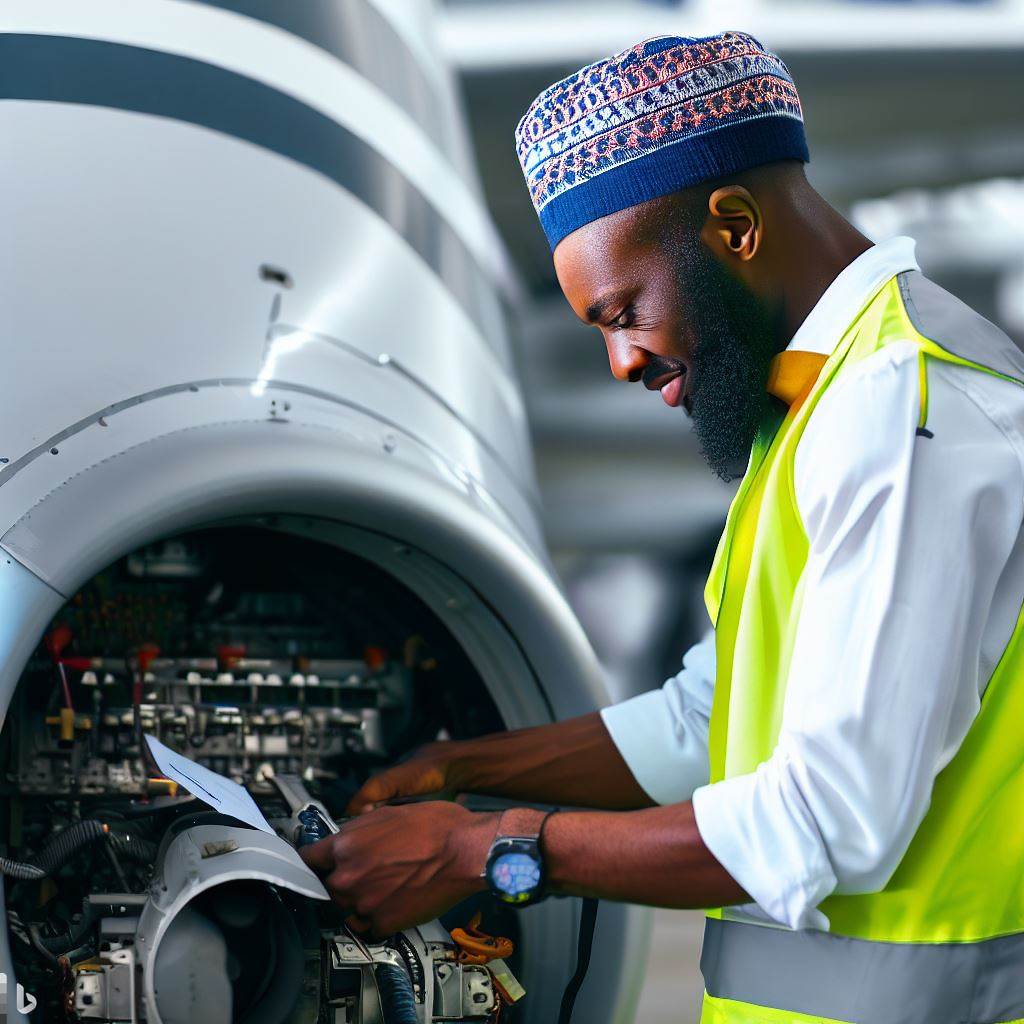Introduction
Flight engineers play a crucial role in Nigerian aviation, ensuring the safe and efficient operation of aircraft. Access to essential tools is vital for their success in this role. These tools enable them to perform their duties accurately and effectively.
Explanation of the Role of Flight Engineers in Nigerian Aviation
Flight engineers play a critical role in ensuring the safe operation of aircraft. They are responsible for monitoring and managing various systems, ensuring optimal performance. Their expertise is vital in emergencies, system troubleshooting, and aircraft maintenance.
Importance of Having Access to Essential Tools for Flight Engineers
- Safety First: Proper tools enable flight engineers to conduct thorough safety checks and prevent potential issues.
- Efficiency and Accuracy: Essential tools improve efficiency and accuracy in diagnosing and resolving technical problems.
- Compliance: Access to the right tools ensures compliance with aviation regulations and maintenance standards.
- Quick Turnaround: Equipped with essential tools, flight engineers can reduce aircraft downtime and turnaround time.
- Professionalism: Having proper tools enhances the professionalism and reliability of flight engineers in the industry.
Most importantly, providing flight engineers with essential tools is crucial for safe and efficient aviation operations in Nigeria.
Safety Tools
A flight engineer in Nigerian aviation must be equipped with essential safety tools to ensure a secure working environment. These tools help in preventing accidents and responding to emergencies effectively.
Multimeter for Electrical Troubleshooting
A multimeter is an indispensable tool for flight engineers as it helps in identifying and troubleshooting electrical issues. It measures voltage, current, and resistance, ensuring the smooth functioning of electronic systems.
Fire Extinguisher for Emergencies
A fire extinguisher is a critical safety tool that flight engineers must have at all times. In case of an onboard fire, the prompt and efficient use of a fire extinguisher can prevent a catastrophe.
Gas Detector for Detecting Hazardous Fumes
A gas detector is essential to identify the presence of hazardous fumes in the aircraft. Flight engineers rely on this tool to detect and mitigate any potential gas leaks, ensuring the safety of the crew and passengers.
First Aid Kit for Minor Injuries
A first aid kit is a must-have for flight engineers to provide immediate medical assistance in case of minor injuries or accidents. It contains essential supplies like bandages, antiseptics, and pain relievers.
Protective Gear such as Gloves, Goggles, and Helmets
Flight engineers should prioritize their safety by wearing appropriate protective gear. Gloves protect hands from electrical hazards, goggles safeguard eyes, and helmets offer head protection in case of turbulence or accidents.
Generally, flight engineers in Nigerian aviation industry must equip themselves with safety tools like a multimeter, fire extinguisher, gas detector, first aid kit, and protective gear. These tools are crucial in ensuring a safe working environment and effectively responding to emergencies.
Read: Role of Data Analysts in Driving Nigeria’s Oil and Gas Sector
Communication Tools
A flight engineer in Nigerian aviation relies on various communication tools to ensure smooth and clear communication during flights.
Walkie-talkies for communicating with ground crew
- Walkie-talkies are essential tools that flight engineers use to communicate with the ground crew.
- These handheld devices enable quick and efficient communication between the aircraft and the ground personnel.
- Flight engineers can provide updates, receive instructions, and coordinate ground operations using walkie-talkies.
- Walkie-talkies are especially useful during pre-flight checks, taxiing, takeoff, and landing.
- They ensure seamless communication, helping to prevent potential misunderstandings and safety hazards.
Satellite phones for communication in remote areas
- In remote areas where traditional communication networks are unavailable, flight engineers rely on satellite phones.
- These phones use satellites to establish communication, allowing for vital communication in areas with limited coverage.
- Flight engineers can use satellite phones to stay in contact with air traffic control, receive weather updates, and communicate emergencies.
- Reliable communication is crucial for flight engineers, ensuring they can make informed decisions and maintain safe air travel.
- Satellite phones offer a vital lifeline for flight engineers, enabling effective communication regardless of location.
Headsets for clear communication during flights
- Headsets are indispensable tools for flight engineers, ensuring clear and uninterrupted communication during flights.
- These specialized headphones provide noise cancellation and two-way communication capabilities.
- Flight engineers can listen to radio communications, receive instructions, and communicate with other crew members.
- Headsets reduce background noise, allowing flight engineers to focus on critical information and relay it accurately.
- Clear communication is essential for flight engineers to effectively monitor systems, address issues, and ensure a safe flight.
Basically, communication tools play a vital role in the work of flight engineers in Nigerian aviation. Walkie-talkies enable effective communication with ground crew, ensuring smooth coordination during ground operations.
Satellite phones provide a lifeline in remote areas where traditional networks are inaccessible, enabling continuous communication in all situations. Headsets allow for clear and uninterrupted communication during flights, essential for effective system monitoring and addressing any issues that may arise.
By utilizing these communication tools, flight engineers can ensure the safety and efficiency of flights in Nigerian aviation.
Read: Oil and Gas Law Careers: The Nigerian Perspective

Diagnostic Tools
A flight engineer in Nigerian aviation relies on various diagnostic tools to ensure the safety and efficiency of aircraft operations. These tools enable them to monitor and evaluate different aspects of the aircraft system, allowing for prompt troubleshooting and maintenance.
Here are some essential diagnostic tools used by flight engineers:
Pressure Gauges
The flight engineer utilizes pressure gauges to monitor cabin and engine pressure. These gauges provide real-time readings, allowing for immediate identification of any abnormal pressure fluctuations.
By closely monitoring the pressure levels, potential issues can be addressed promptly, ensuring passenger safety and operational efficiency.
Test Equipment
Flight engineers rely on test equipment to evaluate electrical systems. These tools help them identify faulty connections, damaged wirings, or malfunctioning components.
By conducting thorough electrical system tests, engineers can quickly pinpoint and address any electrical issues before they escalate or compromise the aircraft’s performance.
Fuel Flow Meters
Fuel flow meters are crucial tools for flight engineers to measure fuel consumption accurately. These meters provide precise readings, enabling engineers to monitor fuel usage in real-time.
By closely monitoring fuel flow, flight engineers can optimize fuel efficiency, prevent fuel leakages, and ensure that there is sufficient fuel for the entire duration of the flight.
Infrared Cameras
Infrared cameras are invaluable tools for flight engineers when it comes to inspecting aircraft components. These cameras can detect temperature variations, allowing engineers to identify potential hotspots that may indicate equipment failure or electrical issues.
Through thermal imaging, flight engineers can proactively address component malfunctions and prevent potential hazards.
All in all, diagnostic tools play a crucial role in the work of flight engineers in Nigerian aviation. Pressure gauges, test equipment, fuel flow meters, and infrared cameras are just some of the essential tools that enable flight engineers to ensure the safety, efficiency, and reliability of aircraft operations.
By utilizing these diagnostic tools effectively, flight engineers can detect and address potential issues promptly, contributing to the overall success and safety of the Nigerian aviation industry.
Read: Field Service Technician: An Unseen Hero in Nigeria’s Oil Sector
Navigation Tools
Flight engineers in Nigerian aviation rely on various essential tools for navigation. These tools ensure accurate positioning and guidance during flights, enabling smooth and safe operations.
GPS Devices for Accurate Positioning
Flight engineers in Nigerian aviation utilize GPS (Global Positioning System) devices to accurately determine their position during flights.
These devices receive signals from multiple satellites, allowing precise triangulation and positioning.
Aviation Charts and Maps for Flight Planning
Aviation charts and maps are indispensable tools for flight planning. These charts provide crucial information such as airspace boundaries, navigation aids, terrain, obstacles, and weather conditions.
Flight engineers use this information to plan their routes and select the best paths for their flights.
Radio Navigation Instruments for Guidance During Flights
Flight engineers rely on radio navigation instruments to navigate and guide their aircraft during flights. These instruments include radio beacons, such as VOR (VHF Omnidirectional Range) and NDB (Non-Directional Beacon), which provide direction and distance information to the aircraft.
Overall, navigation tools are critical for flight engineers in Nigerian aviation. These tools enable accurate positioning, efficient flight planning, and effective guidance during flights.
By utilizing these essential tools, flight engineers can ensure safe and successful operations in Nigerian airspace.
Read: An In-depth Look at Banking Careers in Nigeria
Maintenance Tools
Basic hand tools such as wrenches, screwdrivers, and pliers
In order to perform routine maintenance tasks, flight engineers in Nigerian aviation require a set of basic hand tools.
Wrenches are essential for tightening and loosening nuts and bolts, while screwdrivers come in handy for various applications.
Pliers are useful for gripping and manipulating objects.
Torque wrenches for accurate tightening of fasteners
Flight engineers also need torque wrenches to ensure fasteners are tightened to specific torque values. This is crucial for maintaining the structural integrity of the aircraft and prevents over-tightening or under-tightening, which could lead to malfunctions or accidents.
Inspection mirrors for visually inspecting hard-to-reach areas
Inspecting the entire aircraft can be challenging, especially in areas that are hard to reach.
Flight engineers rely on inspection mirrors to visually examine these areas and identify any potential issues or defects that may require immediate attention.
Hydraulic test equipment for checking aircraft hydraulic systems
Flight engineers must regularly test and inspect the aircraft’s hydraulic systems to ensure they are functioning correctly.
Hydraulic test equipment allows them to measure fluid pressure, identify leaks, and troubleshoot any problems that may arise.
These maintenance tools are essential for flight engineers in Nigerian aviation to effectively carry out their responsibilities. Ensuring the proper functioning and safety of aircraft is paramount, and these tools enable flight engineers to perform their tasks with precision and efficiency.
See Related Content: Successful Electronic Engineers: Inspiring Stories from Nigeria
Flight Data Tools
Flight Recorders
In Nigerian aviation, flight engineers depend on flight recorders to collect essential in-flight data.. These devices allow them to monitor various flight parameters such as altitude, airspeed, and engine performance.
Data Analysis Software for Evaluating Flight Performance
To effectively evaluate flight performance, flight engineers utilize advanced data analysis software. This software helps them analyze recorded data and identify any anomalies or areas for improvement.
Digital Flight Computers for Calculations During Flights
Digital flight computers are essential tools for flight engineers as they enable complex calculations during flights. These computers assist in tasks such as fuel consumption calculations, navigation, and flight trajectory planning.
Flight recorders, data analysis software, and digital flight computers are indispensable for Nigerian flight engineers.
Flight recorders collect in-flight data, aiding analysis and troubleshooting.
Data analysis software evaluates flight performance, optimizing operations.
Digital flight computers perform real-time calculations for navigation and fuel consumption, ensuring safe and efficient flights.
These tools enhance safety, efficiency, and effectiveness in Nigerian aviation.
Training and Reference Tools
Aircraft manuals for reference and troubleshooting
Flight engineers in Nigerian aviation rely heavily on aircraft manuals for reference and troubleshooting. These manuals provide detailed information about the aircraft systems, procedures, and troubleshooting steps for various technical issues.
By having access to these manuals, flight engineers can quickly identify and resolve any technical problems that may arise during flight operations.
The manuals contain step-by-step instructions and diagrams that guide engineers in identifying and rectifying complex issues.
Moreover, aircraft manuals also serve as an essential training tool for flight engineers to enhance their knowledge and skills.
By studying these manuals, engineers can gain a deeper understanding of the aircraft’s systems, its limitations, and the correct procedures to follow in different scenarios.
Simulator training to enhance flight engineer skills
Simulator training plays a crucial role in enhancing the skills of flight engineers in Nigerian aviation. Simulators replicate real-life flight scenarios and allow engineers to practice and improve their operational capabilities in a controlled environment.
During simulator training, flight engineers can familiarize themselves with the specific aircraft they operate, honing their knowledge of the systems and procedures related to their role.
This hands-on experience enhances their ability to handle various emergency situations and troubleshoot system failures effectively.
Simulator training also enables flight engineers to work collaboratively with other crew members, enhancing communication and coordination skills.
This is particularly important during critical phases of flight, where effective teamwork is essential for safe and efficient operations.
Online resources and websites for continuous learning and updates
Flight engineers in Nigerian aviation utilize online resources and websites to ensure continuous learning and stay updated with the latest industry developments.
These resources provide a wealth of information that engineers can access at any time, from any location.
Through online platforms, flight engineers can access training materials, industry publications, forums, and webinars that focus on various aspects of their profession.
They can expand their knowledge base, learn about new technologies, and keep up with regulatory changes that affect their work.
Online resources also enable flight engineers to connect with peers, share experiences, and seek advice from professionals worldwide.
This collaborative environment fosters a culture of continuous improvement and promotes the exchange of best practices in the field of aviation engineering.
Furthermore, these online platforms often provide updates on aircraft manufacturers’ bulletins, service letters, and maintenance procedures.
By staying informed, flight engineers can ensure they are implementing the latest approved practices, enhancing the safety and performance of their flights.
In short, training and reference tools are essential for flight engineers in Nigerian aviation. From aircraft manuals to simulator training and online resources, these tools equip engineers with the knowledge and skills necessary to ensure safe and efficient flight operations.
Conclusion
Essential tools are vital for flight engineers in Nigerian aviation as they ensure safety, accuracy, and efficiency in their work.
Flight engineers must continuously update themselves with the latest tools and technology to remain competent and enhance their performance in Nigerian aviation. This will enable them to overcome challenges and meet the evolving demands of the industry.
Ultimately, flight engineers in Nigerian aviation rely on essential tools to carry out their duties effectively. These tools ensure safety, accuracy, and efficiency in their work, ultimately contributing to the overall success of flights.
It is essential for flight engineers to stay updated with the latest tools and technology to remain at the forefront of their profession. By embracing advancements, flight engineers can enhance their skills, overcome challenges, and adapt to the evolving demands of the industry.
Investing in the right tools and staying abreast of technological advancements is crucial for flight engineers to excel in Nigerian aviation.




